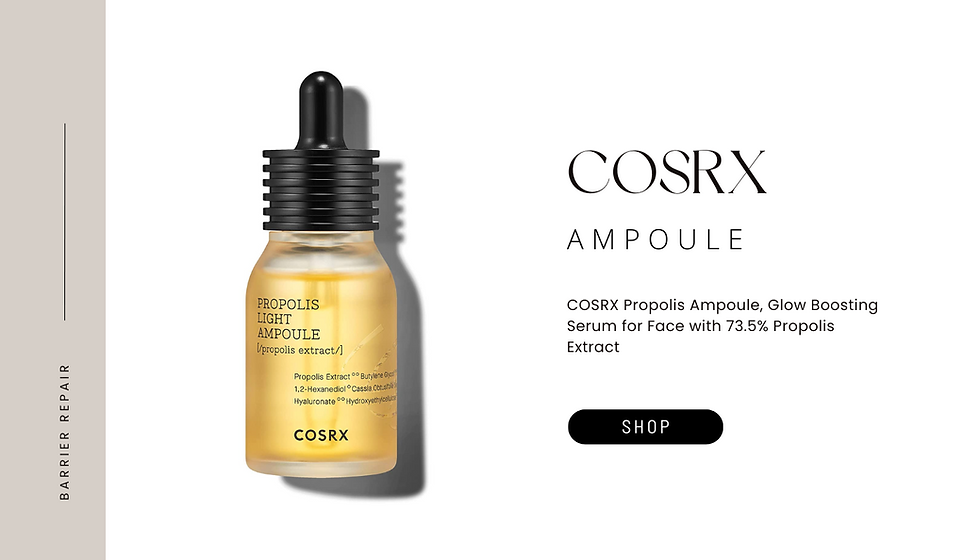How To Repair Your Damaged Skin Barrier - Strengthen and Nourish
- R A E
- Feb 20, 2023
- 4 min read

As someone who has struggled with various skin issues throughout my life, I've learned that one of the most important things I can do for my skin is to focus on repairing my skin barrier.
Our skin barrier plays a critical role in protecting our skin from external stressors, such as pollution, UV radiation, and harsh chemicals. When our skin barrier is compromised, it can lead to a whole host of skin problems, including dryness, sensitivity, and irritation.
Over the years, I've tried countless skincare products, from harsh acne treatments to trendy facial oils, but I've come to realize that the key to healthy, radiant skin is a strong and healthy skin barrier. By nourishing and strengthening my skin barrier, I've been able to improve my skin's overall health and appearance.
If you're struggling with skin issues like dryness, redness, or irritation, it's time to focus on repairing your skin barrier. In this guide, we'll walk you through the basics of skin barrier repair, from understanding what a skin barrier is to provide tips and tricks for nourishing and strengthening your skin.
Why Is Your Skin Barrier Important?
To understand the importance of a healthy skin barrier, think of your skin cells as bricks and the lipids in your skin barrier as mortar. Just like a strong wall needs both bricks and mortar to withstand external pressures, your skin barrier needs both skin cells and lipids to protect your skin from the environment.
The skin cells in your stratum corneum are like bricks, forming a barrier that prevents water loss and protects against harmful substances. However, without the lipids to hold the cells together, this barrier can easily crumble and become compromised.
The lipids in your skin barrier are like the mortar, binding the skin cells together and forming a strong and cohesive barrier. Without these lipids, your skin becomes susceptible to dehydration, irritation, and even infection.
That's why it's important to nourish your skin with products that support your skin barrier.
Without a strong and healthy skin barrier, your skin becomes vulnerable to all sorts of problems. Imagine a breached fortress, leaving your skin exposed to the elements. You may experience dryness, irritation, inflammation, and even infections.
By providing your skin with the right nutrients and hydration, you can help to keep your skin cells and lipids working together in harmony, protecting your skin and keeping it healthy and glowing.
How Do You Identify A Damaged Skin Barrier?
A damaged skin barrier can be caused by a variety of factors, including over-exfoliation, harsh cleansers, environmental factors, age, genetics, and medical conditions.
Here are some common signs that your skin barrier may be compromised or damaged -
Tightness or dryness
Redness or irritation
Increased sensitivity to skincare products or environmental factors
Acne or unusual breakouts
Uneven skin tone or texture
Itching or burning sensation
If you are experiencing any of these symptoms, it's possible that your skin barrier has been compromised. However, it's important to keep in mind that not all of these symptoms are necessarily caused by a damaged skin barrier, and you may want to consult a dermatologist if you're unsure about the cause of your skin concerns.
How Do You Heal A Damaged Skin Barrier?
If you have a damaged skin barrier, there are several things you can do to help heal it. One of the most important steps is to use products that contain ceramides, which are natural lipids that help to repair and strengthen the skin barrier. Look for moisturizers, serums, and other skincare products that contain ceramides, and use them regularly as part of your skincare routine.
Another important step is to reduce over-exfoliation, which can strip the skin of its natural oils and weaken the skin barrier. Limit your use of exfoliating products to once or twice a week, and choose products that are gentle on your skin. It's also important to avoid using harsh products that can irritate the skin and further damage the skin barrier. Look for fragrance-free, non-comedogenic products that are formulated for sensitive skin.
Using a broad-spectrum sunscreen with at least SPF 30 is also important for protecting the skin from further damage. UV radiation can cause premature aging and damage the skin barrier, so it's important to use sunscreen every day, even on cloudy days.
Skincare Ingredient To Look Out For -
In my opinion, the best ingredient to add to your routine is ceramides as they can help to restore and strengthen the skin's natural protective barrier.
Look for ingredients such as hyaluronic acid, and glycerin which help to hydrate and retain moisture in the skin. Antioxidants such as vitamin C, green tea extract, and resveratrol can help protect against free radical damage, while anti-inflammatory ingredients such as chamomile, aloe vera, and panthenol can help soothe and calm the skin.
Squalane is yet another ingredient that helps to improve the skin's texture and suppleness, and peptides, which help to stimulate collagen production and improve the skin's elasticity.
The Best Skin Barrier Repair Products

Incorporating ingredients such as ceramides, avoiding over-exfoliation, using gentle cleansers and moisturizers, and protecting your skin from UV rays are all key steps in repairing a damaged skin barrier. By prioritizing skin barrier repair and giving your skin the care it needs, you can achieve a healthier, more radiant complexion.
Love,
Rae
Image credits - Mike Murray















.jpg)
Comments